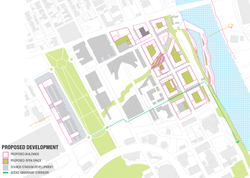top of page

ATOUSA
SHAFIZADEH
© 2023 by Atousa Shafizadeh. Proudly created with Wix.com
Additionally improved bus accessibility and pedestrian/bike routes that promote connectivity to Nashville’s regional transit systems encourage green practices in transportation and resource use. Recreational areas of interest such as the new music-city stage, located along the Sulphur Dell Riverfront park development and the new Stadium Civic corridor allow for a range of restaurants and retail shops to serve the needs of minor-league game customers during the regular season. This corridor creates an entertainment district for future residents and the community at large, providing an inclusive location for the farmer’s market. The existing farmer’s market lands are converted into a multi-use primarily multi-family residential development that permits access to the capital lawn as well as Nashville B-Cycle and existing greenways bridging the Sulphur Dell neighborhood with the civic north of downtown and surrounding neighborhoods. The range of housing options in the proposed Sulphur Dell development allow for affordability that does not sacrifice economic viability. Waterfront real-estate with proximity to areas of civic interest typically present higher rents and draw residents of greater income and economic stability. Sulphur Dell acknowledges this known but provides a community whose social health is not a resource that may be distributed based on income, but one that may be embraced by the community as a whole through distinct neighborhood centers. Phase 1 and 2 development acknowledge the present unorganized development, and provides the literal waterfront “stage” and place of recreation to draw residents from downtown as well as surrounding neighborhoods to create a region that embraces diversity and cultivates a pride of place. The existing condominiums are removed to create a riverfront Park that serves as an iconic neighborhood center connecting to Public Square Park and the surrounding downtown district. Phase 3 construction acknowledges the creation of the new minor-league stadium with coinciding retail, office, and housing options that create retail corridors supported by a range of multi-family spaces. All of these elements create a healthy neighborhood community that provides economic choice, while encouraging concentrated growth.
FINANCIAL STRATEGY
1) More resources are allocated on higher income generating type of building such as for rent housing compared to for sale.
2) Create a campaign for the local to fund the development of public areas such as park by the river and music amphitheater through tax credit deduction. This not only cut some cost down, it also allow up to develop the park at an earlier phase to attract residence and to increase the land appraisal.
3) Retention and expansion of existing hospital helps attracts high end residence such as doctors and nurses to occupy the market-rate residence. Close proximity to the hotel will also help occupy the hotel with visitors and for long term treatments.
4) For existing condominiums that we purchase, we recommended moving the owners to the new affordable apartments instead of paying for compensation. This help us save of the margin that we make from building and selling the apartments.
DESCRIPTION
The ULI Gerald D. Hines Student Urban Design Competition is part of the Institute’s desire to improve architecture students' interest in creating a better live environment through considering a multidisciplinary solutions for design and developement.
Student teams of at least three disciplines have to come up with a comprehensive design and developement for a urban scale site within two weeks. The deliveibles include drawings, site plan as well as tables and financial Pro-forma.
Team Members
Atousa Shafizadeh
Suzan Borazjani
Nur Yusoff (Finace)
Daniel Aros
Aysan Abdollahzadeh
Kevin Mccall
Design Ideas
Sulphur Dell is poised to be the ideal river front neighborhood in the Central Business District of downtown Nashville. Riverfront access combined with multi-various development opportunity from recent construction of the Nashville Sounds’ stadium and the nearby farmers market, pose it to receive a generous community development that will both enhance the livelihood of its residents and serve as a typological basis for a modern community in Music City. Recent flood damage from the rains of 2010 brought Sulphur Dell into the fore as a cause of concern for future residents. This issue was addressed with designing adequate drainage basins along the pedestrian corridors, combining permeable paving and vegetation that allow for slow percolation into the surrounding landscape. The existing storm-water tributaries located along the Music City Bikeway have been enhanced to direct flows away from Sulphur Dell and into the Cumberland River. Tree lined ground-level retail streets encourage walking and healthful pedestrian transportation throughout the site while reducing glare and heat-island effects during warmer months.
uLI uRBAN dESIGN cOMPETITION
 |  |  |  |  |
|---|---|---|---|---|
 |  |  |  |  |
bottom of page